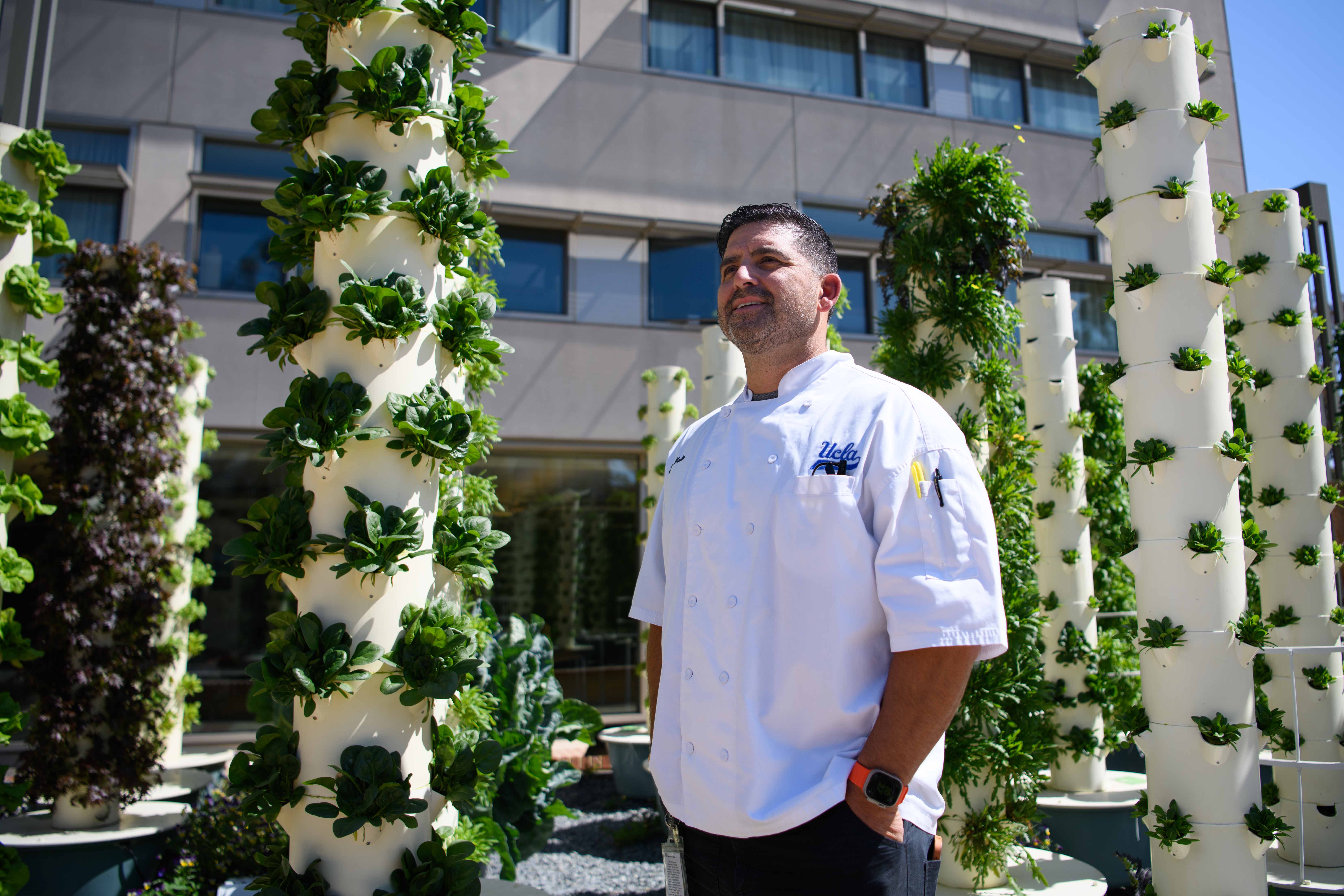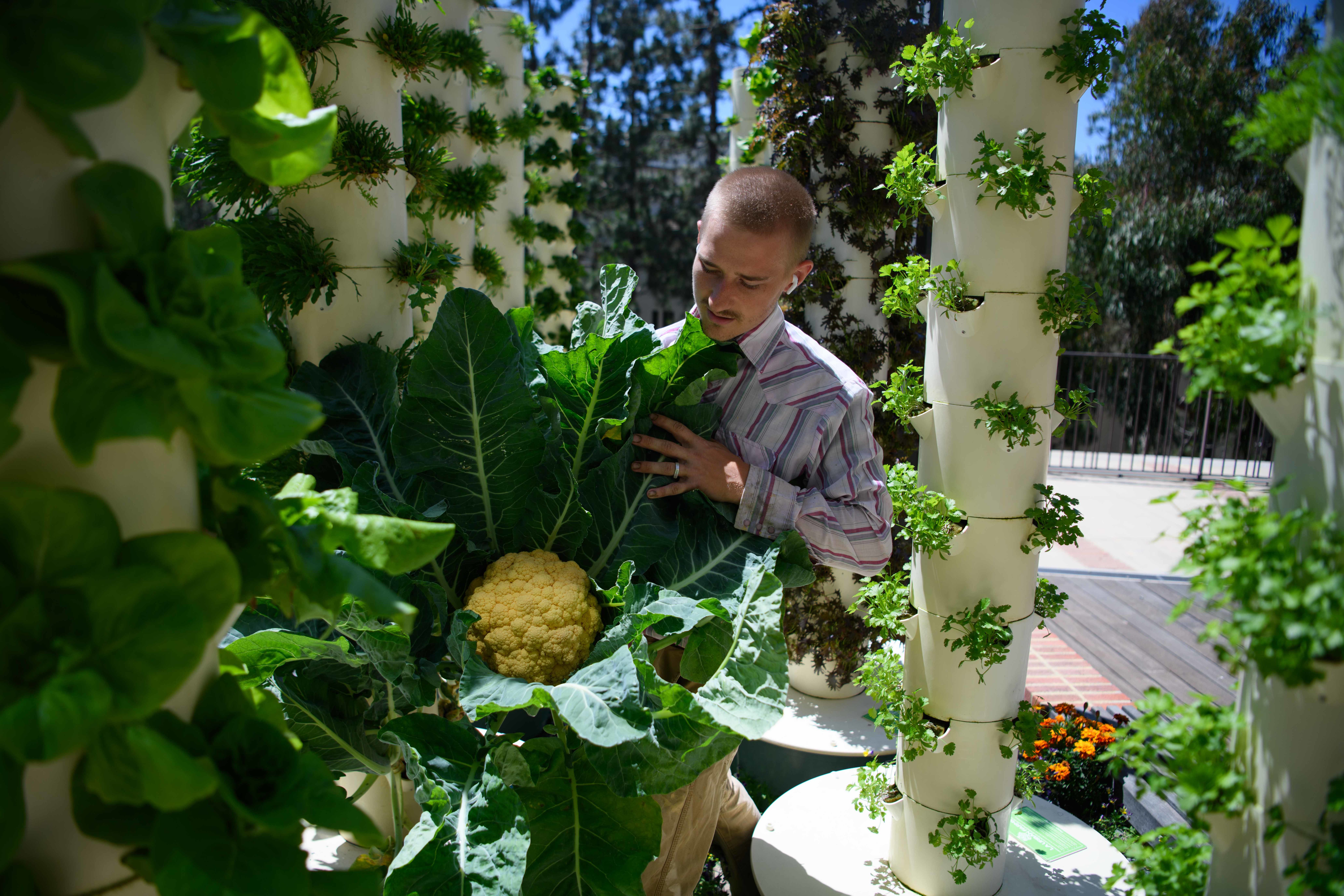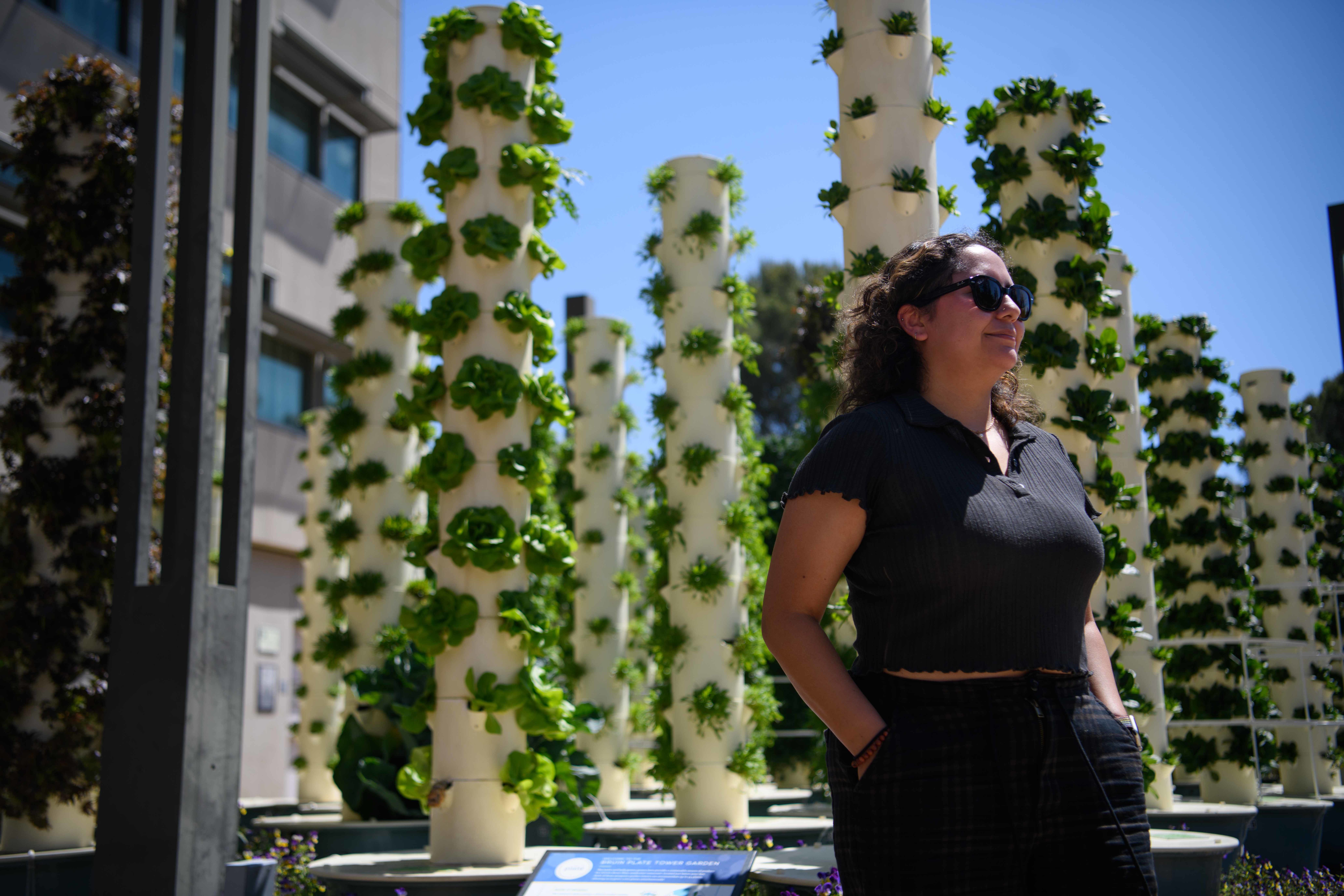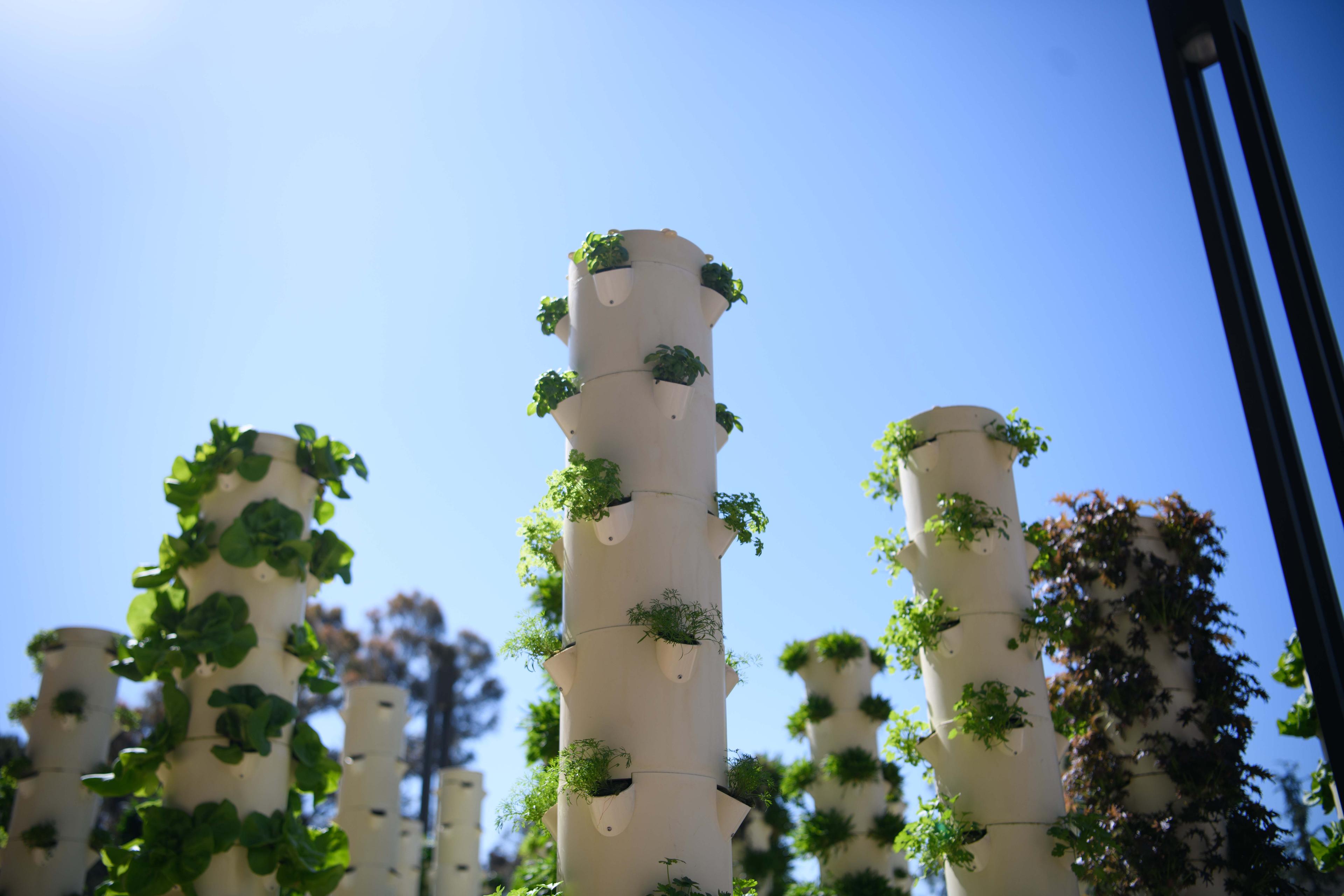Sproul Landing’s aeroponic Tower Gardens bring fresh produce from tower to table
The Tower Gardens on the Sproul Landing Sun Deck are pictured. The towers, installed in 2017, use an aeroponic system that consumes 90% less water than traditional farming. (Nicolas Greamo/Daily Bruin senior staff)
By Sophia Pu
June 25, 2025 6:52 p.m.
This post was updated June 25 at 9:17 p.m.
Gina Osborne thought vegetables could not grow without soil.
But at the Tower Gardens on the Sproul Landing Sun Deck, she does just that.
The vertical gardens consist of 50 cylindrical towers, each covered in staggered rows of 44 pocket-like cavities that hold the plants’ root systems, according to the Semel Healthy Campus Initiative Center at UCLA website. Every 15 minutes, water trickles and drip lines hum as they bathe around 2,200 plants in nutrient-filled water from tanks at the base of each tower.
Each vegetable grown becomes part of a meal at Plateia, the restaurant at the UCLA Meyer and Renee Luskin Conference Center, said Joey Martin, the senior executive chef for UCLA Dining.

The short commute from “farm” to table means the vegetables are at least five days fresher than grocery store produce, said Philip Coffey, a farm tech at LA Urban Farms – which works with Tower Garden, the company that manufactures the setups.
“This is actually some of the cleanest food you could get probably in LA,” Coffey said.
When Osborne – a farming partner with LA Urban Farms – began as a gardener, she said she had a “black thumb” and struggled with keeping plants grown in soil alive. But today, the towers’ automated watering system makes it easy to grow fruits and vegetables, she added.
“As far as getting power back to the people and growing their own food, this to me seems like a really good option, especially in cities where you don’t have large spaces or backyards where you could have a garden,” Coffey said.
The towers, installed in 2017, use an aeroponic system that uses 90% less water than traditional farming, Coffey said, adding that it is particularly necessary to conserve water in LA as it is scarce.
Aeroponic technology, where plants are suspended in air instead of rooted in soil, also allows produce to be harvested within 21 days – two to three times faster than the traditional gardening process, Martin said.

Every Thursday, Coffey said Osborne and her team harvest up to half of the tower gardens’ produce and plant new seedlings, which are grown in advance at Oak Creek Farm and Homestead in Temecula.
Osborne regularly sits down with Martin to provide expertise on what plants are in season, said Wendy Coleman, the founder of LA Urban Farms. She then procures specific vegetables tailored to Plateia’s seasonal menus, including orange cauliflower in the winter, as well as sun gold tomatoes and baby Persian cucumbers during the spring, Osborne said.
“The fun part of the job is always working through the seasons and learning what grows and why it grows,” Martin said. “We like to experiment with different things.”
A grassy smell filled the air as Coffey pulled cilantro plants from the towers, carrying them in bunches in his arms. Coffey examined their golden roots, which he said are kept intact to retain nutrients and freshness.
Regardless of how many nutrients are in the tank, Coffey said the water’s pH level must also be balanced to prevent “nutrient lockout,” which occurs when the plants stop uptake of nutrients, become discolored or cease growth.
“I like to say we listen to the plants,” Osborne said. “If all else fails, and I’ve tried adjusting the pH, tried adding more nutrients, we just change the water.”
LA Urban Farms first installed towers at Ronald Reagan UCLA Medical Center to reduce stress and anxiety for patients, particularly those with trauma, Coleman said. The hospital’s gardens inspired Nurit Katz, UCLA’s chief sustainability officer at the time, to bring them to campus.
The Sproul tower gardens’ vegetables and herbs were originally intended to be used at Bruin Plate, but the amount of vegetables from the harvest did not last through a meal period, Martin said.
“We can tell a story down there (at Plateia),” Martin said. “We eliminate a lot of waste because we can control it a lot better in the portions down there.”
Leftover harvest that goes unused by Plateia’s chefs is repurposed in another catering kitchen, Osborne said. Coffey added that vegetable scraps are repurposed to feed chickens and pigs on Osborne’s farm.

The gardens’ proximity to Plateia also reduces greenhouse gas emissions from transporting the produce, said Brianna Moncada, the sustainability manager for UCLA’s housing and hospitality services.
Jacob Thene, co-director of the research committee at Compas at UCLA, a student club that advocates for farmworkers’ rights, said he believes the spinach and lettuce grown in the towers would not typically be grown near LA and instead would have to be transported from around the central coast of California.
Nearly one-fifth of total food sector emissions comes from transporting food to its destination, according to a 2022 study by Nature Food.
Sourcing hyper-locally will help contribute to the UC Office of the President’s goal to procure 25% of campus food sustainably by 2030, Moncada said. She added that UCLA Dining and ASUCLA are currently at just over 19%.
“Especially in a country where it’s overwhelmingly urban populations, we don’t talk about – and we don’t think about – we’re not connected to the place our food comes from,” said Thene, a second-year economics student.
Farm techs do not use pesticides on the produce grown in the tower gardens, Coffey said. Osborne added that the farmers control pests through natural means, such as growing buckwheat to attract ladybugs that eat aphids.
Osborne said she hopes that when students come to relax by listening to the towers’ fountain-like sounds, they think about how to bring aeroponic farming to other urban spaces.
“We aim to inspire people to grow their own food and to empower them to look at the world with new eyes and see the untapped potential in all the unused spaces around them,” said Jennifer Crane, a partner of LA Urban Farms.
